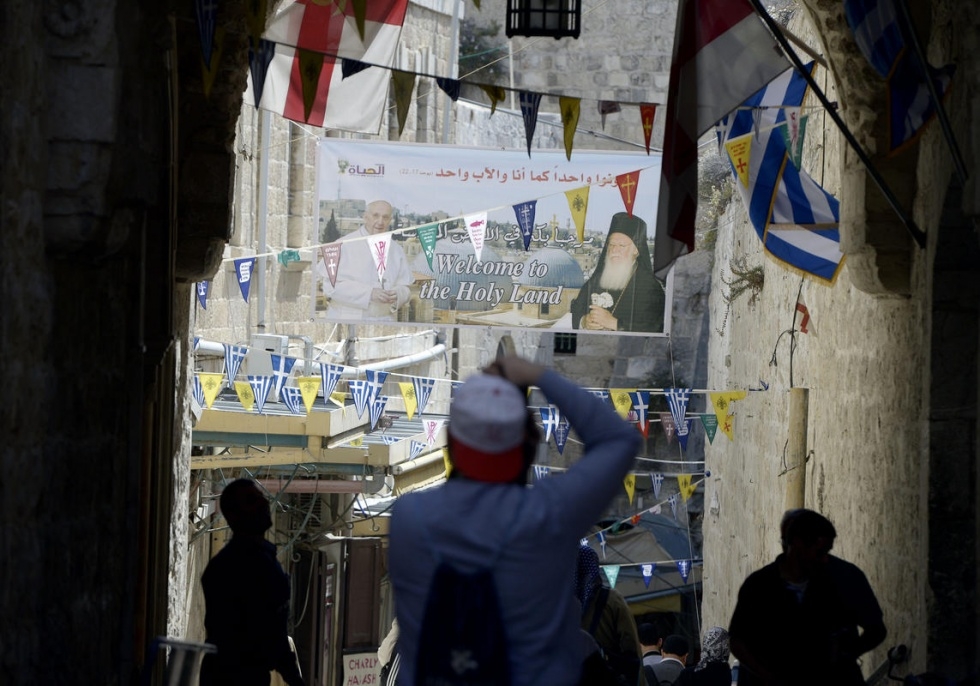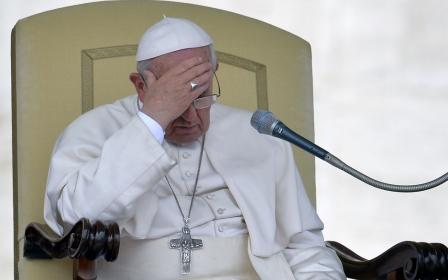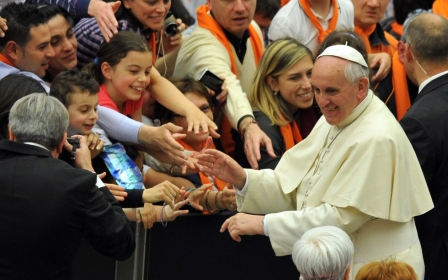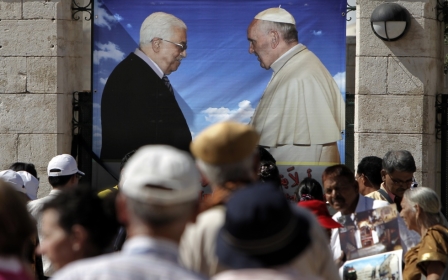Dying Israel-Palestine congregations keep the faith

Although Manger Square in Bethlehem in usually well-kept, it is extraordinarily immaculate this week. Palestinian workers are still rushing about securing lighting rigs and speaker stacks as part of last-minute preparations for the arrival of Pope Francis on Sunday.
The work is intensifying because on that day, the square outside the Church of Nativity will be packed with up to 9,000 Christians and 1,000 media attending a mass to be conducted by him after his arrival there by helicopter from Jordan.
Tickets to the mass have been issued to Christians from Jerusalem, Ramallah, the Galilee and Gaza. But not all will be able to attend and a papal spokesperson, Father Jamal Khader, admitted this would be “a big mass in a small space”.
Just a 10-minute car journey separates Bethlehem and Jerusalem, but a separation wall between the two and a checkpoint have created a barrier to Christians accessing holy sites in Jerusalem.
The pope will also experience, albeit indirectly, rigid Israeli rules around security. Although his next destination is Jerusalem, due to Israel law, following his Bethlehem visit Pope Francis must first take his helicopter to Ben Gurion International Airport in Tel Aviv to be greeted by Israeli President Shimon Peres and Prime Minister Benjamin Netanyahu.
New MEE newsletter: Jerusalem Dispatch
Sign up to get the latest insights and analysis on Israel-Palestine, alongside Turkey Unpacked and other MEE newsletters
Only after completing this "welcome ceremony" can he then travel on by helicopter to Jerusalem.
Streets have been closed in Jerusalem preventing Palestinians and Arab-Israeli Christians from being on the streets in East Jerusalem when the Pope visits there later on Sunday evening and Monday. The measure has infuriated sections of the minority.
A ghost city
“We demand that Palestinian Christians be allowed to be on the streets and that the city of Jerusalem should not be placed under curfew, we would like the pope to use his diplomatic capacity in a situation where the peace process is almost completely halted,” said Hind Khoury from the Sabeel Ecumenical Liberation Theology Center and former Palestinian minister for Jerusalem Affairs.
Head of the Jerusalem Inter Church Center, Yusef Daher said he had been in a meeting ahead of the Pope’s visit with Israeli officials.
“It will be a ghost city. One Catholic was asking an Israeli during these planning sessions of the visit and he told him: ‘I don’t really understand, there will be nobody in the streets of Jerusalem except cats?’ the Israeli answered, ‘not even cats’”.
Unlike the large audiences that see the Pope most Wednesdays in Rome, Arab-Israelis living in Jerusalem will not get the same privilege.
“This has been the case in every single visit of the pope, we had a very hard time with pope Benedict’s visit and it seems we will not get in touch with this holy visitor,” said Daher.
According to Khoury, Jerusalem is increasingly closed to Palestinians. She said that during Easter time it was nearly impossible for Palestinian Christians to get access to the Church of the Holy Sepulchre and holy sites within the Old City.
“The Old City has been closed to some degree since 2006, even when Christians are given permits to come from the cities in the West Bank to visit Jerusalem at the gates of the Old City they find it’s very difficult to go in and to reach the place of worship and Christian pilgrims also have this problem especially during holy week.”
Christian decline
The statistic are grim - in 1947, the last year of British rule, 85 percent of Bethlehem’s population was Christian. In Jerusalem it was around 19 percent but today it is 20 percent and 1.8 percent respectively.
The number of Christians across all of Israel is currently 125,000, but there are no official population statistics in the occupied West Bank and East Jerusalem. In the Gaza Strip the Christian population is around 1,400.
Yusef Daher said there were only 8,000 Christians left in Jerusalem and that a report that Christians wanted to emigrate of their own volition wasn’t entirely correct.
“My brother who in in the US now, was deprived the right to come back to Jerusalem, they [the Israeli authorities] revoked his residency right.”
A recent survey carried out by Near East Consulting in Ramallah showed that 62 percent of Christians in Jerusalem wanted to emigrate. A third of them said they knew of one family who had left in the last five years.
Bernard Sabella an expert on Palestinian Christian history and demography who oversaw the recent survey said of the 300 Christians surveyed, 81 percent believed the occupation was the biggest challenge they faced. This was followed by settlements and an absence of a peace process, then by a variety of economic factors including unemployment and housing.
“One of the problems Christian Palestinians always come back to is really the absence of a political solution,” said Sabella.
This week Israeli authorities placed three Israeli citizens under house arrest during the time of the Papal visit with the belief the Jewish ultra-nationalist would disrupt the visit in some way.
There has been a growing fear that “price tag” attacks against the Christian community would occur during the Papal visit.
Head of Jerusalem Inter Church Center Yusef Daher said he had kept a record of price tag attacks over the past five years.
He said the number had doubled from 10 attacks in 2012, to 22 in 2013.
In early May vandals wrote “death to Arabs and Christians” in Hebrew on the Vatican’s Notre Dame Centre in Jerusalem’s Old City and similar graffiti was found on a wall close to the Romanian Orthodox church.
Just weeks earlier attacks occurred against Christians in the Galilee, where a place of worship was vandalised and stones thrown at pilgrims. A radical rabbi also sent a threatening letter to a priest in Nazareth.
“We think that fanatic Jewish individuals or groups are encouraged indirectly at least by the Government policy, which is not interested in peace, which is encouraging more settlements during the peace talks and which claims exclusivity over the Old City for the Jewish majority,” he said.
Hopes from the Pope’s visit
Local worshippers are hoping Pope Francis will use the whirlwind trip to Israel and the West Bank to recognize their plight but after the collapse of recent peace talks they are not hopeful.
“We cannot expect much for the Pope - but we need a message of justice and peace, or encouragement, of hope for the future,” said Father Jamal Khader, head of the Latin Patriarchate Seminary and Spokesperson for Pope Francis’s visit.
Hind Khoury said she believed it was within the Pope’s mandate to condemn the occupation and the treatment of Palestinians.
“The visit of a very high moral authority in the world is needed - what is happening in Jerusalem is not only an abuse of international law and human rights it’s so morally incorrect that one people is given the right to life, while another people is denied the simple right to live.
“I think the Pope is very much in his mandate to speak out and condemn the violence and injustice that is ongoing here and I also think that as a man of the church he will not be interfering in a conflict, because a conflict assumes two equal parties, but here we have an occupying power and an occupied people, this lack of parity is a source of injustice that also the church has a mandate to actively interfere,” said Khoury.
With an eye towards promoting reconciliation and unification between restive religious groups, Pope Francis is traveling with Rabbi Abraham Skorka and Omar About, a leader of Argentina’s Islamic community - two friends from his time as archbishop of Buenos Ares.
Middle East Eye delivers independent and unrivalled coverage and analysis of the Middle East, North Africa and beyond. To learn more about republishing this content and the associated fees, please fill out this form. More about MEE can be found here.




